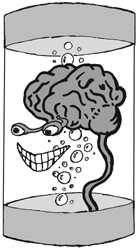![[Metroactive Features]](/features/gifs/feat468.gif)
[ Features Index | Silicon Valley | Metroactive Home | Archives ]
 What Is Brain?
What Is Brain?
By Annalee Newitz
SOMETIMES SCIENCE JOURNALISM is nothing but a cheap Star Trek episode. This is most dangerous with big stories whose subjects lend themselves to one-word exclamatory titles like Cloning! Extraterrestrial Life! Hackers! Nuclear Waste! I mean, does anyone really expect a serious high-minded investigation of scientific phenomena after they read a headline that makes them think of space monsters sucking data out of the Pentagon's computers in order to clone the president? Nope. They want to read about plagues and nuclear disasters that affect only the bad guys, or some equally implausible but exciting thing. They want shiny machines and glowing embryos. In short, they want to discover that the real world is just like The X-Files. Case in point: last week's cover story in Newsweek. I used to read Newsweek a lot when I was a liberal high school student living in suburbia, but this week, it caught my eye. The headline hovers enticingly over a picture of a woman's head surrounded by little psychedelic, sparkly dots. "Fixing Your Brain," it reads (why is it always a woman's brain that's portrayed as needing to be fixed?). The package is broken up into several future-looking articles on possible brain rehab techniques--including a cure for "obsessive thoughts" that involves implanting electrodes in your brain that send out a burst of electricity when you punch a button. But mostly the package feels more like a chronicle of human wishes than it does science reporting. Indeed, the premise of most of the stories isn't "Here's how your brain works" or "Here's a realistic picture of brain-related tech." Instead, the articles explore why people want desperately to repair their damaged or deteriorating brains. A long anchor story called "The Disappearing Mind" seems intended mostly to provoke memory-loss paranoia among middle-aged people who are watching their elders succumb to Alzheimer's. And here's the science-y part: the story leaves us with promises of a cure for our dying and desiccated brains. Old age will be better than you think, the authors tell us. Science will save you. But science couldn't give a shit about me. I'm not an investor or a grant-maker. I can barely afford health insurance. That's what makes this kind of Star Trek-y science writing so misleading. Our desires and dreams are cast as inevitable developments rather than as expensive possibilities that may never be realized. There is no discussion of the professional battles and patent foul-ups and heaps of cash involved in every tiny step scientists take toward actually fixing our poor little broken brains. Sadly, there is more science truth in James McCamant's new book, Biotech Investing (Perseus), than there is in the brain issue of Newsweek. Right now, biotech is more about the stock market than helping end users--er, I mean patients--like you and me. The companies and technologies that survive to (maybe) help us are not always going to be the best. They'll be the ones with the biggest budgets. If our brains ever get fixed at all, they'll be repaired with the biotech equivalent of Microsoft Windows. Sure, rich folks will get some special souped-up system with a custom install and maybe even a full-time brain engineer to keep things from crashing. But the rest of us? When we start forgetting our friends' names, we'll be on the phone with brain tech support, and they'll require us to remember our service package number before they can help us with our cortical implants. The whole sad and silly mess reminds me of that dumb episode of Star Trek where these alien chicks steal Spock's brain to provide power for their city but keep forgetting why they did it. When a rampaging Kirk starts slapping them around and asking where Spock's brain is, one of the women looks at him blankly and asks, "Brain? What is brain?" Most of us are like Kirk, savagely hunting for the brains of our friends who have somehow managed to lose them--to age, to disease, to madness. A lot of scientists are like that, too. But unfortunately, our ability to get at those brains is under the control of a bunch of dumb capitalists who just want to keep the brain because it will give them more power and money. That is the true, sad, non-science fictional story of science. Most of the people controlling its development don't understand what they're doing. And the rest of us, who do understand, have no power.
Annalee Newitz (brain@techsploitation.com) is a surly media nerd who is only watching movies about dragons this week.
Send a letter to the editor about this story via email . [ Silicon Valley | Metroactive Home | Archives ]
|
From the June 27-July 3, 2002 issue of Metro, Silicon Valley's Weekly Newspaper.
Copyright © Metro Publishing Inc. Metroactive is affiliated with the Boulevards Network.
For more information about the San Jose/Silicon Valley area, visit sanjose.com.